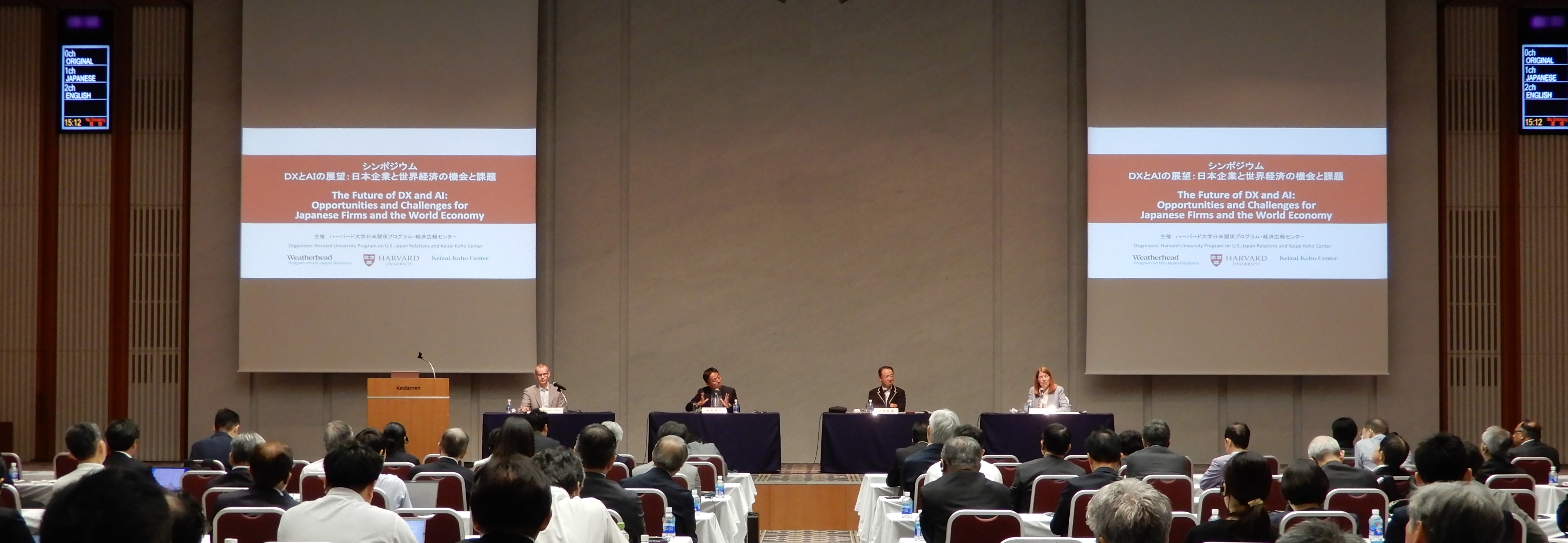
Symposium The Future of DX and AI: Opportunities and Challenges for Japanese Firms and the World Economy
July 11, 2024
Tokyo
On July 11, Keizai Koho Center and Harvard University Program on U.S.-Japan Relations held a symposium titled “The Future of DX and AI: Opportunities and Challenges for Japanese Firms and the World Economy.” The symposium was moderated by Dr. Christina Davis, Director of the Japan-US Relations Program at Harvard University Program.
The first panel, “The Future of DX and AI: Perspectives from Harvard University,” presented interdisciplinary approaches to understanding the impact of digital transformations and AI on business, politics, society, and the arts. Dr. Hirotaka Takeuchi, Chair of International Christian University Board of Trustees and Professor Emeritus at Harvard Business School, illustrated how Moderna was able to develop and commercialize its messenger RNA technology rapidly by March 2020 through its “digitization building blocks” of cloud, Internet of Things (IoT), analytics, and AI. Dr. Takeuchi suggested that while Japanese firms may be currently behind in developing such digitization building blocks, they may also have advantages in catching up to adopt AI in the long run. Dr. Kosuke Imai, Professor of Government and Statistics at Harvard University presented findings from his research on AI-assisted decision-making related to the pretrial Public Safety Assessment (PSA) and gerrymandering of electoral districts in Ohio. He argued that AI’s impact on improving human decision-making varies widely, and depends on its applications to particular issues and contexts. Dr. Alexander Zahlten, Professor of East Asian Languages and Civilizations at Harvard University, focused on how advances in AI are transforming the artistic production of audiovisual materials, and argued that national branding and soft power are shifting from content-based to platform-based production. He pointed in particular to the tourism sector, which will increasingly be shaped by real-time data collection and transmission by tourists and AI-enhanced translation on various platforms.
In the second panel, “Cybersecurity and AI: An Agenda for Japanese Corporations,” Dr. Davis engaged in a wide ranging conversation with Mr. Shinichi Yokohama, CEO of NTT Security Holdings and Group CISO of NTT Corporation, and Mr. Yasumasa Yamamoto, Adjunct Professor of Graduate Schools of Management at Kyoto University. Mr. Yokohama emphasized his three guiding principles: (1) do not aim for zero incidents, as cyber incidents are inevitable; (2) support frontline engineers, publicize their work, and trust them to do their work; and (3) develop capabilities to verify the corporation’s cybersecurity performance. He also noted that much of cybersecurity work occurs not at the technical level, but at the managerial level, in which corporate leaders commit themselves to apply these principles in their entire organization. Mr. Yamamoto spoke of the importance of human capital in the successes of Big Tech companies, and how corporate leadership can shape where the best human capital ends up among the Big Tech companies over time. He also noted that big Japanese corporations can change and succeed, in similar ways to US-based Big Tech companies, especially if they team up with startups. During Q&A, there were further discussions on the role of the government and policy in promoting and regulating AI, Japan’s policy of the Data Free Flow with Trust (DFFT), and probable impact of quantum computing.
A total of 185 people from businesses and academia attended the symposium.
